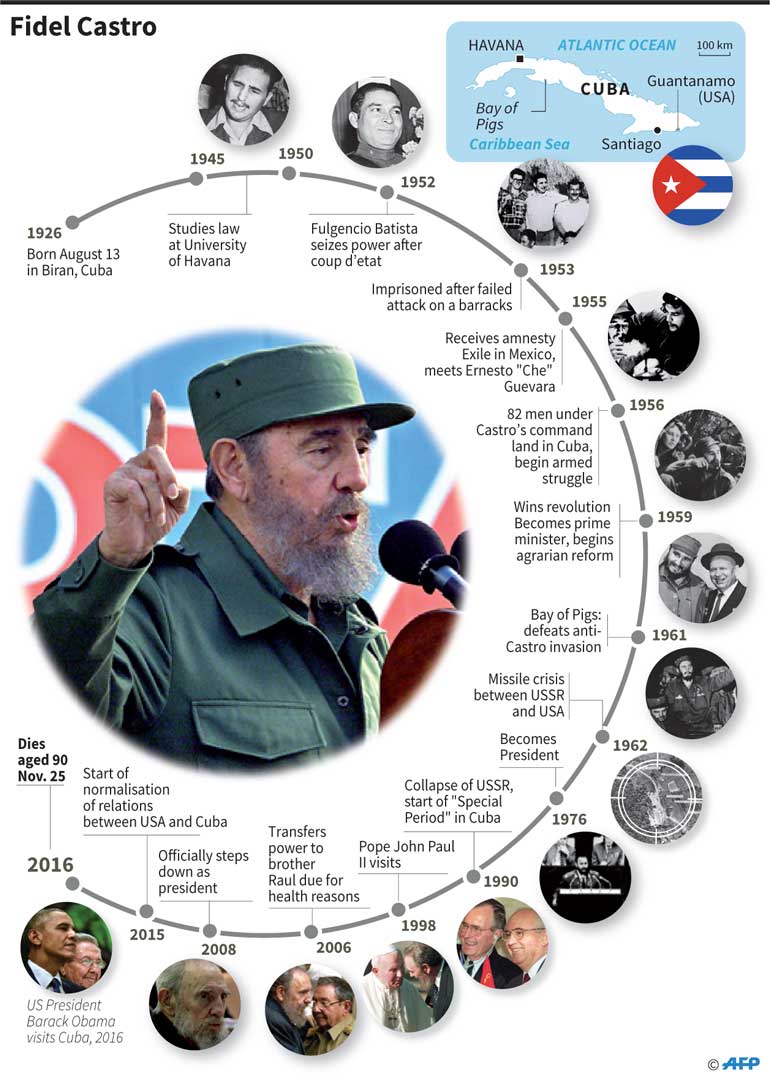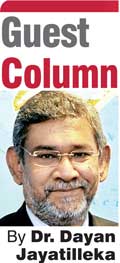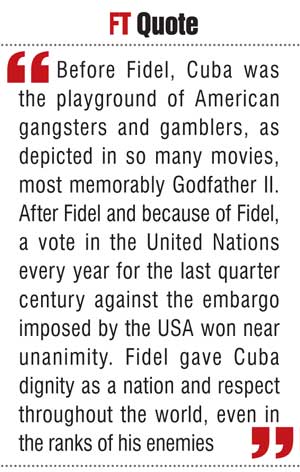Sunday Dec 14, 2025
Sunday Dec 14, 2025
Monday, 28 November 2016 00:01 - - {{hitsCtrl.values.hits}}
 Fidel was the last of the epic heroes. Whatever our travails, our generation and the ones before us were fortunate to live in the decades in which there were great leaders, visionaries who combined their ideal with action and changed the world they inherited.
Fidel was the last of the epic heroes. Whatever our travails, our generation and the ones before us were fortunate to live in the decades in which there were great leaders, visionaries who combined their ideal with action and changed the world they inherited.
Our generation and one, perhaps two before that, lived consciously in the twentieth century which was inhabited by such heroes. My own generation lived at the time of Mao, Ho Chi Minh, Tito, Fidel and Che Guevara. We were lucky to have read of and watched these Homeric heroes as they fought colossal enemies against incredible odds; led and changed reality and became legend.
With Fidel gone we are almost at the end of an age, perhaps a cycle of History—the age of modern heroism, but with a continuity going back millennia to the dawn of the hero. I say ‘almost’ because the Moncada and Granma generation is not dead, the companeros of Fidel and Che, namely Raul and Ramiro Valdez, are still alive and active, as are Fidel’s Latin American political sons such as Daniel Ortega of Nicaragua and Salvador Sanchez of El Salvador.
It was almost 60 years ago (2 December 1956) that Fidel, Che and Raul landed on the shores of Cuba in the leaky yacht Granma, to start the revolutionary guerrilla war that led to victory two and half years later.
One would expect that it would be fairly easy for someone such as myself who has authored a book on Fidel, published in the UK/US, to write a short article on him, but it is actually quite difficult. There is so much to say about Fidel because he did so much, tried to do so much, and meant so much to so many of us, that it is difficult to isolate just a few aspects or points for a short reflection.
There will be a huge sense of irreplaceable loss most palpably in Cuba and the whole of Latin America, but it will range wider, throughout the Global South and even in the First World. No country will be untouched.
Before Fidel, Cuba was the playground of American gangsters and gamblers, as depicted in so many movies, most memorably Godfather II. After Fidel and because of Fidel, a vote in the United Nations every year for the last quarter century against the embargo imposed by the USA won near unanimity. Fidel gave Cuba dignity as a nation and respect throughout the world, even in the ranks of his enemies.
In his The Rebel, Albert Camus drew a distinction between a ‘revolutionary’, who was one who used unlimited violence to change the whole system and a ‘rebel’, who used limited and selective violence to oppose wrongs and injustice. Camus opted for the rebel over the revolutionary. Fidel was a rebel and a revolutionary. He opted for revolutionary war to overthrow a system and build a new one but his use of violence was selective and discriminatory in the best sense.
Fidel also transcended another seemingly unbridgeable gap. He was a revolutionary as well as a statesman. He led a revolution and supported, defended and inspired others, but he also piloted the Cuban state through the most dreadful dangers and against the worst odds. Che Guevara refers to Fidel’s leadership which he said no one could have matched, during the “sad and luminous days” of the Cuban Missile Crisis where it lived under the shadow of a US military invasion and perhaps global nuclear war, but did so  unflinchingly, unblinkingly.
unflinchingly, unblinkingly.
Ardent internationalist
Fidel was a patriot, steeped in the Cuban national spirit and heritage, while also being an internationalist on a grand scale. Mere months after the victory of the Cuban revolution he sent tanks to defend Algeria which had just achieved its liberation. Hosting a farewell dinner for the Cuban ambassador in Sri Lanka last month, Florentino Batista, I said half-jokingly that had Fidel been the president he would have sent troops to fight alongside Assad’s forces, the Iranians and the Hezbollah, as he did in during the October 1973 Yom Kippur war to protect the road to Damascus from the Israeli forces of General Ariel Sharon who were on the offensive.
The Cuban ambassador exclaimed that he had been surprised to discover he had an uncle who served with an army engineering unit in Syria at the time.
Nelson Mandela went on the record to credit Cuba with the decisive role of defeating the powerful (nuclear armed) South African military in the battle of Cuito Cuenevale in Angola in 1988, which shattered the myth of white South African military invincibility and opened the prison door for Mandela and a negotiated end to apartheid in South Africa. Fidel personally oversaw the Angolan campaign from across the Atlantic.
Angola also shed light on what I was the first to identify in the academic literature as Fidel’s greatest single contribution, namely his evolution and practice of a humane and humanitarian ethics of violence. Three hundred and fifty thousand Cuban volunteers rotated in and out of Angola over 12 years of war and there was not a single allegation of atrocities against them in the UN Human Rights Commission in Geneva, even by the United States.
Just as the Catholic saints Ambrose, Augustine and Thomas Aquinas evolved and codified the Just War theory for rulers and states, Fidel, who had a Jesuit education and formation, practiced and developed Just War in both anti-state liberation struggle as well as when he led the Cuban state in fighting against domestic terrorism and imperialist oppression throughout the world.
Fidel stood for independence, national liberation and national and state sovereignty. The slogan of the Cuban revolution was famously ‘Patria O Muerte!’ (‘Fatherland or Death!’). This sentiment became especially valid globally after the fall of the USSR and the dawn of an imbalanced unipolar world. In such a context Fidel felt it was all the more relevant and necessary to fight for the unity, sovereignty and territorial integrity of the nation state as a bulwark against imperialist domination and state segmentation (as in Yugoslavia).
Fidel Castro was an anti-imperialist who was never a fanatic. He always combined his anti-imperialism with a sense of the welfare of humanity and the planet as a whole, and he put forward proposals for global structural reform which could ensure the welfare of all. While a militant anti-imperialist he was not an advocate of war for the sake of war, polarisation and radicalisation. Almost  singlehandedly he fought to forestall an Israeli attack on Iran by means of a long, persuasive interview to Jeff Goldberg of The Atlantic magazine, knowing that the influential journalist of this conservative publication would be read in Washington and Tel Aviv.
singlehandedly he fought to forestall an Israeli attack on Iran by means of a long, persuasive interview to Jeff Goldberg of The Atlantic magazine, knowing that the influential journalist of this conservative publication would be read in Washington and Tel Aviv.
‘Great synthesizer’
From his earliest interview with Herbert Mathews of the New York Times while fighting in the Sierra Maestra mountains, to the famous, almost seductively cinematic mid-1970s interviews with Barbara Walters, to the documentaries by Vietnam war veteran and famous Hollywood filmmaker Oliver Stone, Fidel always reached out to the American public. He never hired lobbyists. He was Cuba’s best lobbyist, simply by charm of personality and force of argumentation.
Thus Fidel was the great synthesizer or was himself the great synthesis, fusing factors and attributes that were regarded as unbridgeable antinomies. Fidel taught us all, a way to be. The way of the fighter, the warrior, the hero. Fidel was, to borrow the title of Brazilian author Paul Coelho’s book, a great “Warrior of Light”. But his was not merely or primarily a martial heroism. His own greatest hero and inspiration was the Cuban patriot Jose Marti, and Fidel’s favorite phrase, almost a motto, was derived from Marti: the Battle of ideas. Fidel Castro was then a global guerrilla commander, the commander-in-chief, in the “battle of ideas”.
Looking back on my life as one who was lucky enough to have been born in the year, the month and around the time that Fidel, Raul and Che were landing on the shores of Cuba in the Granma, I am glad to have been able to make a modest contribution to the theoretical comprehension of Fidel’s contribution. TeleSUR, the Venezuela based Latin American TV station interviewed me on Fidel’s 90th birthday this last August and interviewer Naomi Cohen summarised my perspective as follows: “The liberation fighter loyal to Fidel’s teachings can ultimately overcome and vanquish imperialism through weapons of ethics and morality.” I told her in that interview that “Fidel proves that you can fight without losing your soul. Even if you lose militarily, you win morally and eventually politically. Fidel has universal value wherever people and movements are struggling.”
I also explained that “it is not merely a Latin American phenomenon, still less a merely Cuban phenomenon, still less a 20th century phenomenon. Fidel has contributed to universal values.”
Naomi Cohen’s TeleSUR interview with me included the following idea from my book on the Moral Dimension of the Political Thought of Fidel Castro:“According to Fidel’s logic, the liberation and revolutionary fighter must exercise “conscious restraint,” writes Jayatilleka in “Fidel’s Ethics of Violence” while simultaneously drawing on a moral philosophy that “does not rest on culturally specific and circumscribed notions (such as those that inform many jihadist groups) or claims of self-evident (actually, self-referential) systemic superiority,” as is the case of western imperialist states. Instead, Fidel calls for an ethics that “springs from the wellsprings of modernity and universalism but stands for an alternative modernity.”
‘Alternative Ethic of Rebellion and Resistance’
The premier Mexican newspaper La Jornada carried an interview with me on Fidel while I was Sri Lanka’s Ambassador in Geneva, conducted by its correspondent Kyra Nunez, on 17 November 2007, in Spanish. My book on Fidel had come out that year. Headlined in her article were the following:
“He is the most relevant political thinker born in the 20th century,” says Dayan Jayatilleka to ‘La Jornada’. “Fidel Castro contributed an Alternative Ethic of Rebellion and Resistance,” The Sri Lankan ambassador in Geneva reflects on the trajectory of the Cuban leader in a book.”He [Fidel] has never questioned the right of the oppressed to exercise violence.”
The Latin American progressive audience apart, my theorising of Fidel’s singular contribution made its way into rigorous western scholarship and will now be engaged with by every serious student of Castro.Nick Hewlett, D.Litt, author of a book on the French philosophers ‘Badiou, Balibar, Ranciere’ (Bloomsbury 2007) has just put out his volume ‘Blood and Progress: Violence in Pursuit of Emancipation’ (Univ. of Edinburgh Press, 2016) in which he has a Chapter on Fidel Castro which concludes:
“Most importantly, for our purposes, Castro is deeply reflective on the ethics of violence in revolt and offers the most developed morality in relation to violence in pursuit of emancipation of any revolutionary leader. We might say that Castro and the practice of the Cuban revolution offer the spirit with which we should approach the question of violence in revolt, which promotes the importance of the life and wellbeing of all human beings, with the regretful acknowledgement that fighting and loss of life in pursuit of a substantially more just and less exploitative society is sometimes necessary. This is, at the very least, a highly inspiring way to approach the question.”
Prof. Hewlett summarises what I concluded was Fidel’s abiding contribution, in my book on Fidel:
“In an insightful study, Dayan Jayatilleka (2007) examines Castro’s ethics of violence, suggesting that the Cuban leader resolved the disagreement between Sartre and Camus regarding violence and morality, namely where Sartre was critical of Camus for Camus’s disapproval of the violence of the oppressed. Castro’s main contribution to Marxism, Jayatilleka argues, is the way in which he introduces an ethical and moral dimension. Jayatilleka suggests there are three possible approaches to violence: by those who contend that violence is always wrong, by those who defend it if it is in pursuit of a just end, and by those who argue that not only should the end be a worthy one but that the means of achieving this end must be subjected to ethical scrutiny.
“It is this last position which he argues is the correct one and the one which Castro embraces. Jayatilleka argues convincingly that neither Sorel nor Fanon nor Sartre: ‘went beyond the understanding of the effect of dehumanization of the violence of the oppressor on the oppressed and the effect of humanization on the oppressed of the exercise of counter-violence, to an understanding of the effect of dehumanization of violence on the oppressed (which the Gandhians and other pacifists understood), when used by them without limits. There is no dialectical understanding of the violence of the oppressed, encompassing its contradictory aspects, both liberating and dehumanizing...’”
Winston Churchill’s famous lines of praise for the RAF flyers applies, with slight modification, several times over to Cuba and Fidel Castro: “Never in the field of human conflict and contemporary history have so many owed so much to one country and one man.”